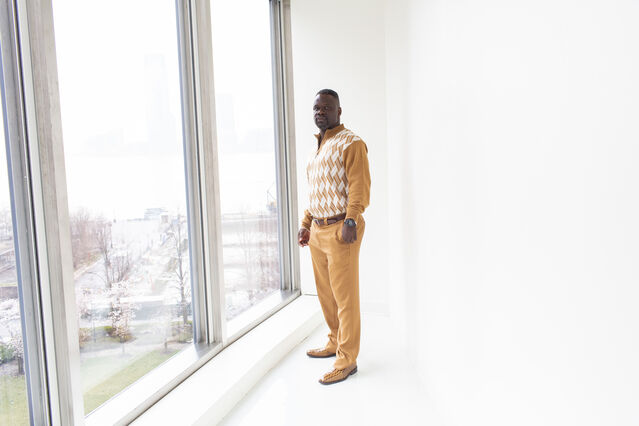Health
Confronting the Mental Health Consequences of Solitary Confinement
Writer and activist Ian Manuel describes the toll of isolation in childhood.
Posted June 9, 2021

Ian Manuel survived 18 years in solitary confinement, a practice classified by the United Nations as torture and strongly condemned by psychological organizations.
When he was 13, Ian and a few older children attempted a robbery, during which Ian shot a woman, Debbie, who was severely injured but survived. Ian was sentenced to life in prison without parole. The following year, he called Debbie to apologize, a moment of connection that would evolve into an enduring friendship; she later advocated for his release.
Ian describes his experience in confinement, including horrific abuses from correctional officers as well as the coping skills he developed to survive, in his book My Time Will Come: A Memoir of Crime, Punishment, Hope, and Redemption.
What coping skills helped you survive your time in solitary confinement?
I was placed in solitary at such a young age. I was there for 18 years, from age 15 to age 33. My mentality was stunted and my growth was stunted, so I got caught up in my imagination. I used to imagine, for instance, being free and performing on stage. I imagined people cheering for me as I rapped or recited poetry. But I had to come up and confront reality sometimes, as painful as it was, because I didn’t want to go crazy. I wanted to survive with my sanity and my humanity intact.
Imagine a dolphin or whale underwater. It has to come up for air every now and then to survive. That was me and my imagination. I would dive into the depths of my imagination, but I would come up for air. There are people, sadly, who never came up for air. There are people for whom reality was too painful to bear. They would slip into schizophrenia and other mental disorders.
But sometimes I was not able to dive into my imagination and fight it off. There were times that I cut myself. A poem I wrote, “Bloody Mirror,” grapples with this pain. Sometimes reality was too much for me.
How did you start writing poetry?
After reading a love poem, “If I Had a Heart,” I started liking poetry. I thought, “Wow, if I could write like that…” I challenged myself and started reading some of the greats, like Langston Hughes and Maya Angelou.
Then one day they let me out of my cell for one hour. They put me in the TV room chained up and they tuned it to PBS as a punishment, because prisoners like to watch sports and entertainment. A documentary was on, To Be Heard, about three south Bronx teenagers learning to express themselves through slam poetry. I couldn’t wait to get back to my cell to write what I had seen.
How is solitary confinement distinct for children and adults?
Solitary stunted my growth. I went through puberty in solitary confinement and grew up around only men. I wasn’t able to develop relationships—I’m learning about dating in my 40s, when this is something you’re supposed to learn when you’re 14.
I still don’t know how to drive a car. I still don’t know how to cook. My girlfriend set up my copier and this ring light. It’s like a role reversal in the relationship. She grew up out here so these things come naturally, whereas I look at it like it’s something from outer space: How the hell do I make this copier work?
You describe multiple abuses by correctional officers. How did you navigate that abuse?
I resisted being controlled. Some correctional officers have sadistic tendencies, and I’m not a masochist, so I resisted being controlled. If you show any weakness—any tears from being gassed, any anger from being beaten, any crying out from being stripped—they increase the punishment.
But if you stand up for yourself, and hold in your tears no matter how much it hurts, they leave you alone. You have to psych yourself out that what’s being done to you isn’t painful. It’s crazy.
How did you process those experiences after you were released?
My social worker, Maria Morrison, helped me. I had to protect myself in prison, and when someone then tried to care for me and nurture me it took a while for those walls to come down. But I let her in my life, and it’s one of the best decisions I ever made.
After I was released, I went to an intense therapy program. During one of my sessions, I couldn’t breathe, and my guide said, “Ian, I want you to face whatever you’re running from head on.” I had been describing a scene in prison where I was being choked and gagged with a tube stuffed down my throat. They were pumping my stomach for nothing—I didn’t have pills in it. I wouldn’t open my mouth, so the nurse pinched my nose and grabbed my throat until I opened my mouth.
At the time, I couldn’t show any weakness. But my guide told me to face that moment. I broke down in tears, and eventually my breath came back. That’s the first time I realized, “Whoa, this therapy sh*t really works!”
New York recently banned solitary confinement beyond 15 days. What was your reaction to the news?
It’s a step in the right direction. But this is a human rights crisis that needs to be changed immediately, and more states need to follow suit. It’s up to people like me to go to congress and testify. The way human beings are treated in solitary confinement is something out of a draconian movie, and it needs to be rectified.




